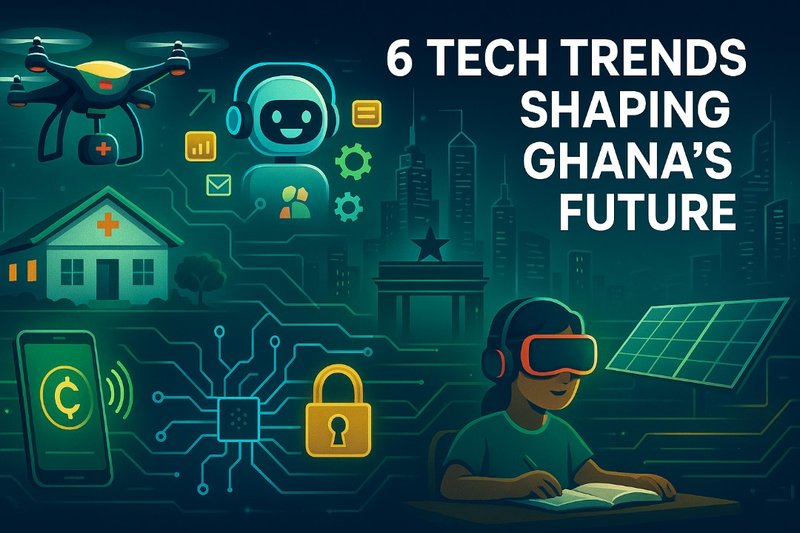6 Game-Changing Tech Trends Transforming Ghana in 2025 and Beyond
Introduction
Technology is no longer a side conversation in Ghana — it’s the engine driving national development, business innovation, and youth employment. As the global tech landscape evolves, Ghana is actively adopting, localizing, and scaling many of these trends to solve real challenges in healthcare, finance, education, and sustainability.
In 2025, six major technology trends are not only reshaping the world — they are quietly transforming Ghana’s systems, industries, and digital future. From AI-powered business tools to quantum cybersecurity, these innovations are setting the tone for how Ghana competes, grows, and leads in the digital age.
Here’s a look at the key tech trends changing Ghana’s future — and what they mean for startups, professionals, and the everyday Ghanaian.
1. Drone-Backed Telemedicine: Redefining Healthcare Access
What it is: Telemedicine is the use of digital technology to deliver medical services remotely. When combined with drone technology, it enables the delivery of supplies and data in real-time to remote areas.
In Ghana: Zipline’s drone delivery program has been delivering vaccines and blood supplies since 2019. Now in 2025, Ghana is piloting 3D virtual diagnostics, allowing doctors across the continent to review patients’ scans remotely. A notable project in Koforidua recently demonstrated how these two technologies combined can offer life-saving services in rural communities.
Why it matters: This changes how Ghana responds to emergencies, reaches remote patients, and reduces the cost of healthcare logistics.
2. AI Agents and Smart Automation: The Rise of Digital Workers
What it is: Agentic AI refers to autonomous systems that perform complex tasks without needing constant human prompts. These digital agents can think, plan, and execute like a human assistant.
In Ghana: Businesses are beginning to deploy AI agents for customer service, WhatsApp automation, invoice reconciliation, and appointment scheduling. With platforms like ChatGPT and voice AI services, even small startups can afford intelligent assistants.
Why it matters: Smart automation reduces business costs, increases productivity, and helps local companies scale without needing large teams. For Ghana’s youth, it also opens new roles in AI training, support, and supervision.
3. Edge Computing and IoT: Powering Real-Time Mobile and Rural Innovation
What it is: Edge computing is the processing of data near its source — instead of relying on distant cloud servers. Internet of Things (IoT) refers to devices connected to the internet that collect and exchange data.
In Ghana: Edge and IoT are transforming agriculture, mobile money, and logistics. Farmers use soil sensors to monitor moisture and health in real-time. Mobile platforms like GhIPSS and GhanaPay rely on fast, secure transaction systems built on edge computing.
Why it matters: This ensures faster, more reliable services even in areas with poor internet, while enabling smarter tools for Ghana’s informal sectors.
4. Quantum Computing and Cybersecurity: Preparing for a Post-Quantum World
What it is: Quantum computing solves complex problems far faster than traditional computers. It also threatens today’s encryption standards, which protect financial and personal data.
In Ghana: While quantum computers are still emerging globally, the conversation has started in fintech and IT policy circles about post-quantum cryptography — new ways to secure data in a future where quantum hacking is possible.
Why it matters: Ghana’s growing digital economy must prepare early to secure banking apps, government platforms, and user privacy before quantum computing becomes mainstream.
5. Spatial Computing and Immersive Education: The Next Phase of Interaction
What it is: Spatial computing blends virtual reality (VR), augmented reality (AR), and real-world environments to create interactive 3D experiences.
In Ghana: Though still niche, developers are experimenting with virtual property tours, AR learning apps for students, and immersive storytelling platforms for tourism and heritage promotion.
Why it matters: Spatial computing offers new ways to teach, sell, and train — especially helpful in education, creative media, and diaspora real estate.
6. Green Tech and Sustainable Infrastructure: Powering the Future Responsibly
What it is: Green technology focuses on reducing environmental harm through energy efficiency, clean energy, and eco-friendly systems — especially in tech-heavy sectors like data centers.
In Ghana: As internet and cloud usage grow, discussions around green energy for powering ICT hubs are gaining traction. Some startups are exploring solar-powered networks and sustainable server hosting.
Why it matters: Ghana’s energy-hungry tech future must align with climate goals. Investing in green tech today avoids higher costs and environmental crises tomorrow.
Conclusion
Ghana’s digital transformation is accelerating. These six trends — once seen as distant or futuristic — are already reshaping how Ghanaians live, work, and innovate. As these technologies mature, Ghana’s readiness to adapt them will define its leadership in Africa’s tech ecosystem.
💬 What Do You Think?
Which of these tech trends do you believe will have the biggest impact on Ghana in the next 3 years?
Are there any local innovations or startups already working in these areas?
Let’s share insights and ideas in the comments — your voice could inspire the next breakthrough.




Comments (0)
Leave a Comment
No comments yet. Be the first to comment!